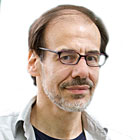Podcast: Darwin’s Predictions
Here is an interesting podcast I was interviewed for last year. Go here and click on the green podcast symbol to listen to a discussion about the origins debate and Darwin’s predictions.
Here is an interesting podcast I was interviewed for last year. Go here and click on the green podcast symbol to listen to a discussion about the origins debate and Darwin’s predictions.
 .
. 
I have just been reading two articles on Intelligent Design which appeared in The Guardian recently: Science in God’s image (May 3, 2010) and
Intelligent design is an oxymoron (May 5, 2010). After reading the articles, I decided to write a detailed commentary on them both.
The first article is by Professor Steve Fuller and represents his personal view. Although his personal “take” on intelligent design is a controversial one in ID circles, Professor Fuller certainly has a clear grasp of what ID is and where it is heading.
The second article is by Professor Michael Ruse. Professor Ruse has previously debated ID proponents, including Professor William Dembski, so one might reasonably expect him to write a well-informed critique. However, after reading his latest article, I regret to say that Professor Ruse never seems to have understood the nature of the Intelligent Design project in the first place.
Read More ›
Over this past week I’ve been engaged in some blogging at the website of the Guardian, the UK’s traditional left-of-centre paper in connection with a new book of mine that defends the pursuit of science as an ‘art of living’ on theological grounds – ones not so different from the ‘Scotist’ ones pursued by Vincent Torley here recently. In response to my piece, which was set up with my defending ID from charges of ‘bad theology’, Michael Ruse has now entered the fray, producing one of the most bigoted anti-ID statements I’ve seen in a long time. I know that many regard Ruse as some kind of moderate in these debates but …. you can judge for yourself.
In her recent paper, The Non-epistemology of Intelligent Design: Its Implications for Public Policy, evolutionary philosopher Barbara Forrest states that science must be restricted to natural phenomena. In its investigations, science must restrict itself to a naturalistic methodology, where explanations must be strictly naturalistic, dealing with phenomena that are strictly natural. This is the consensus position of evolutionists and, in typical fashion, Forrest uses this criteria to exclude origins explanations that allow for the supernatural. Only evolutionary explanations, in one form or another, are allowed. She writes: Read more
A new measure of information has been invented – the Zettabyte = 1,000,000,000,000,000,000,000 bytes, or 10^21 bytes.
Zettabytes overtake petabytes as largest unit of digital measurement Heidi Blake, 4 May 2010, The Telegraph UK “The size of the “digital universe” will swell so rapidly this year that a new unit – the zettabyte – has been invented to measure it.”
Humanity’s total digital output currently stands at 8,000,000 petabytes – which each represent a million gigabytes – but is expected to pass 1.2 zettabytes this year. Read More ›
Cornelius Hunter’s post includes quotes from Niles Eldridge, George Gaylord Simpson, Joseph Le Conte and Pierre Teilhard de Chardin saying that “evolution” is a firmly established fact. The inclusion of these names caught my attention, because all have made rather clear and dramatic statements to the effect that the fossil record does not support the idea of gradual change; the first three are quoted in my new book In the Beginning and Other Essays on Intelligent Design . These, plus a similar quotation from Teilhard de Chardin, are reproduced here, for those of you who do not want to buy the book. Since nearly everyone agrees that “Nature does not make jumps,” I see only two possibilities: 1) When these Read More ›
Evolutionists disagree amongst themselves about the theory of evolution but they agree about the fact of evolution. If there is one point of agreement within evolution-dom, it is that evolution is a scientific fact. A few years after Darwin died Joseph Le Conte explained that evolution is a law, not a theory, and it is a law to which every department of natural studies must adhere. It is not merely as certain as gravity, “Nay, it is far more certain.” Similarly, Teilhard de Chardin maintained that “evolution is a light which illuminates all facts, a trajectory which all lines of thought must follow—this is what evolution is.” Read more
Enjoy!
My newest book, Intelligent Design Uncensored, co-authored with Jonathan Witt, is now available. You can purchase it here at Amazon.com. It provides a nice overview of the scientific issues at stake but then also deals with the cultural spillover as it relates to both the theistic and atheistic evolutionists.
The theory of evolution states that biological change occurs by the natural selection of otherwise unintelligent biological variation. Organisms just happen to vary in their designs, and those that work better are better represented in later generations. But recent research shows change occurring far more rapidly than such a blind process could generate. The results not only are yet another falsification of an evolutionary prediction, they also demonstrate the limited usefulness of the theory. Read more
The most common question evolutionists ask, when presented with the many scientific problems with Charles Darwin’s theory, is “what’s your idea?” The simplest known form of life is immensely complex, if evolution is true then many advanced mechanisms of biology must have evolved early on—before they were needed, new species appear abruptly in the fossil record, adaptation occurs via intricate mechanisms that respond to the environment, similar species reveal profound differences, and different species reveal profound similarities. The fundamental predictions of evolution have gone wrong and so it would seem only natural to question the theory. Is it not reasonable for evolutionists to ask “what’s your idea?” It would seem so, but in fact that simple question reveals what is Read More ›
If we were to think of the height of the Eiffel tower as representing the age of our earth then the existence of humanity would be nothing more that the skin of paint on the pinnacle knob. This was the opening perspective offered by Professor of Philosophy Sean Kelly whose inaugural lecture at this year’s Annual International Bioethics Forum on the science of consciousness kick started a series of talks by a preeminent cast of academic thinkers and speakers. Kelly’s ensuing factual inventory set the tone for others to follow. During their brief history, humans have become a force that has incontrovertibly impacted our planet. 95% of that skin of paint of human existence occurred before the advent of agriculture. And during that time humans have shown that they are the only beings with a capacity not only for complex language but also for storing information outside of themselves in the form of books and multimedia. No other species dwells upon historical time like we do.
University of Minnesota ethnopharmacologist Dennis McKenna, who spoke immediately after Kelly’s ‘opener’, concurred. Complex language, he noted, depends on synesthesia-style relationships between spoken words and a corresponding set of symbols that imbue our daily experiences with meaning. When this phenomenon emerged no one knows for sure although the deepest historical evidence to-date, that of the Blombos Cave in South Africa, suggests that it may have existed as early as 75,000 years ago. Read More ›
Check out this new ID-relevant [“ID-friendly” is too strong — ID proponents will get no preferential treatment] peer-reviewed journal: BIO-Complexity. The Evolutionary Informatics Lab (www.evoinfo.org) has an article under submission there. Editor in Chief Matti Leisola, Enzymology and Enzyme Engineering; Helsinki University of Technology, Finland Editorial Board David Abel, Origin of Life; The Origin-of-Life Science Foundation, United States Douglas Axe, Protein Structure–Function; Biologic Institute, United States William Basener, Statistics and Population Modeling; Rochester Institute of Technology, United States Michael Behe, Biochemistry and Biological Complexity; Lehigh University, United States Walter Bradley, Origin of Life; Baylor University, United States Stuart Burgess, Biomimetics and Biomechanics; University of Bristol, United Kingdom Russell Carlson, Biochemistry; University of Georgia, United States William Dembski, Mathematics and Information Read More ›
I used to believe facts and figures counted. I thought that objective, obvious evidence would carry the day. But evolutionists have long since dispelled such silly notions for me. In one public debate with a professor, I read through a dozen or so objective, scientific failures of evolution. With a wave of the hand the professor easily dismissed the entire list. “Those,” he assured the audience, “are all fallacies.” It later became obvious he hadn’t the foggiest idea of what he was talking about. Read more

I would like to thank Dr. Sullivan for his recent post, Nature, Artifacts, Meaning and Providence which has helped to clear the air enormously. In his closing comments, Dr. Sullivan calls for calm in the debate over life’s origin, and urges that the origin of life should be examined dispassionately, in an atmosphere free from theological bias. He is of course quite right, and in this post, I intend to engage him on precisely those terms. What I propose to do is address some general issues raised by Dr. Sullivan in his latest post on ID.
Life – an agreed definition?
While our views on the formal conditions for something’s being alive are somewhat divergent, I think we can now agree on the finalistic conditions.
Read More ›